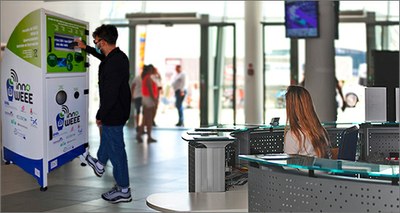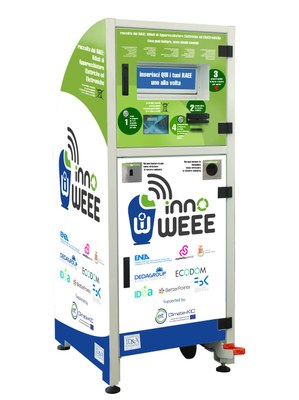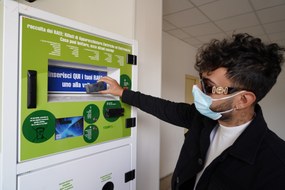Environment: Ecomondo, ENEA presents Smart Bin, the electronic waste bin that offers discounts
12/11/2020
 Smart Bin, an “intelligent” container which issues discount coupons to citizens who properly dispose of electrical and electronic waste (WEEE) is on its way. Smart Bin, one of the innovative solutions for the circular economy and environmental sustainability that ENEA presented at Ecomondo -the international fair on the Green Economy which this year takes place digitally (until November 15th)- can recognize waste, rewarding the disposal of mobile phones, PCs and tablets, which are an actual gold mine of gold, silver, palladium, copper and other high-value materials contained in the electronic cards.
Smart Bin, an “intelligent” container which issues discount coupons to citizens who properly dispose of electrical and electronic waste (WEEE) is on its way. Smart Bin, one of the innovative solutions for the circular economy and environmental sustainability that ENEA presented at Ecomondo -the international fair on the Green Economy which this year takes place digitally (until November 15th)- can recognize waste, rewarding the disposal of mobile phones, PCs and tablets, which are an actual gold mine of gold, silver, palladium, copper and other high-value materials contained in the electronic cards.
Smart Bins, which measure approximately 170 x 50 x 60 centimeters, are easy to place and empty and open only with the user’s health card. The first models have been installed near schools, supermarkets and public places in Cava de 'Tirreni, in the province of Salerno, and others will follow in Trento and Bath (United Kingdom) as part of the European project INNO-WEE (Innovative WEEE traceability and collection system and geo-interoperability of WEEE data). The receipt issued after disposal shows the greenhouse gas emissions avoided and the amount that can be spent in several affiliated businesses ranging from bakers to bookshops.
 "The project aims at creating an innovative and replicable model to encourage proper recovery, reuse and recycling of electrical and electronic waste, in line with the principles of the circular economy - Marco Tammaro, head of the ENEA Laboratory of Technologies for Reuse, Recycling, Recovery and Enhancement of Waste and Materials explained - This is why we are working at improving the traceability of the supply chain, promoting an actual cultural change through a reward system of the most virtuous behaviors and providing technical-scientific support to local authorities, also through transfer of innovative methodologies and tools for the adoption by citizens of the best practices available ".
"The project aims at creating an innovative and replicable model to encourage proper recovery, reuse and recycling of electrical and electronic waste, in line with the principles of the circular economy - Marco Tammaro, head of the ENEA Laboratory of Technologies for Reuse, Recycling, Recovery and Enhancement of Waste and Materials explained - This is why we are working at improving the traceability of the supply chain, promoting an actual cultural change through a reward system of the most virtuous behaviors and providing technical-scientific support to local authorities, also through transfer of innovative methodologies and tools for the adoption by citizens of the best practices available ".
Proper disposal of electrical and electronic waste is also a health issue. In Italy and Europe, statistics data show low collection rate (there is a tendency to keep them at home or to dispose of them improperly) compared to a 3-5% annual growth, with risks to health and the environment. The activities of the recycling industry in Italy mostly concern the early stages of the treatment process, which are less profitable, whereas the noble parts of waste are sent to specialized recovery plants, mainly in Northern Europe.
"That’s why we believe that electrical and electronic equipment reuse and WEEE recycling through sustainable technologies is essential to offer benefits in terms of reduction of landfilling, extension of the life of equipments, production of secondary raw materials, as well as opportunities for “green jobs”, with the creation of new entrepreneurial initiatives and jobs”, Tammaro said.
 As part of the project - funded by EIT KIC Climate - a web platform was also developed, based on interoperable data and standard ICT protocols- which collects data on WEEE flows localization and transport of the devices collected along the entire supply chain, from transfer to recovery and recycling; educational paths to promote regeneration and reuse of electrical and electronic equipment still usable, correct recycling and assessment of valuable materials to be reintroduced into the production cycle; communication campaigns on social networks for students and citizens, such as Si può RAEE di più, + ricicli + sconti, with videos and interviews with ENEA researchers, as well as promotional actions through "game design" to encourage elementary school children to collect WEEE.
As part of the project - funded by EIT KIC Climate - a web platform was also developed, based on interoperable data and standard ICT protocols- which collects data on WEEE flows localization and transport of the devices collected along the entire supply chain, from transfer to recovery and recycling; educational paths to promote regeneration and reuse of electrical and electronic equipment still usable, correct recycling and assessment of valuable materials to be reintroduced into the production cycle; communication campaigns on social networks for students and citizens, such as Si può RAEE di più, + ricicli + sconti, with videos and interviews with ENEA researchers, as well as promotional actions through "game design" to encourage elementary school children to collect WEEE.
In addition to ENEA, the Italian partners of the Inno-WEEE project include the companies Dedagroup (coordinator), Erion (formerly Ecodom) and Metellia Servizi, the municipalities of Cava de 'Tirreni and some municipalities in the province of Trento, the Bruno Kessler Foundation and the City of Bath and Better Points in the UK. .
ENEA at Ecomondo and Key Energy
At Ecomondo the ENEA experts attend events dedicated to bioeconomy and sustainable agri-food systems; sustainable technological innovations for recycling and recovering materials and energy; Green New Deal and smart food chains with low environmental impact; air pollution and COVID-19; management of sewage sludge; composting and anaerobic digestion; health impact assessment; the Italian platform of circular economy actors (ICESP); separate collection of the textile fraction of urban waste; the European agenda for strategic research and innovation as an engine for the transition to the circular economy (project Cicero); digitalization and technological innovation to monitor and optimize safety, resilience and sustainability of urban and industrial water infrastructures.
At the same time, as part of Key Energy, the international expo for technologies, services and integrated solutions to promote and accelerate the transition process towards the decarbonisation of the economy, ENEA experts participate in events dedicated to: integration and evolution of energy networks for the development of renewable sources; ecological reconversion after COVID-19; the future of hydrogen in Italy; the role of P2G and hydrogen for the decarbonisation of industry and the energy sector; finance for energy efficiency; energy efficiency in the industrial and tertiary sectors; research and innovation for energy efficiency: challenges and future scenarios; energy requalification of buildings: the super bonus 110%.
For more information on Smart Bin:
Marco Tammaro, ENEA – laboratory of Technologies for Reuse, Reciclying, Recovery and Enhancement of Waste and Materials; marco.tammaro@enea.it,
Enea presenta Smart bin, il contenitore per i rifiuti elettronici che fa gli sconti - video
